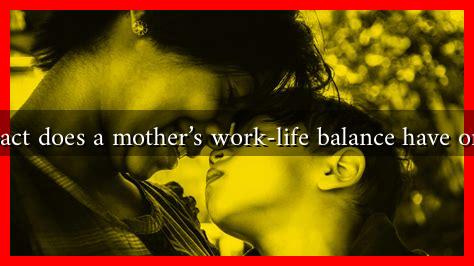-
Table of Contents
What Impact Does a Mother’s Work-Life Balance Have on Children?
In today’s fast-paced world, the concept of work-life balance has gained significant attention, particularly for mothers who juggle professional responsibilities with family life. The impact of a mother’s work-life balance on her children is profound and multifaceted, influencing their emotional, social, and cognitive development. This article explores the various dimensions of this relationship, supported by research, statistics, and real-life examples.
The Importance of Work-Life Balance
Work-life balance refers to the equilibrium between personal life and professional responsibilities. For mothers, achieving this balance is crucial not only for their well-being but also for the overall health of their families. A well-balanced mother is more likely to be emotionally available and engaged with her children, which can lead to positive developmental outcomes.
Emotional Well-Being of Children
Research indicates that a mother’s work-life balance significantly affects her children’s emotional health. When mothers experience high levels of stress due to work-life imbalance, it can lead to:
- Increased Anxiety: Children may pick up on their mother’s stress, leading to feelings of anxiety and insecurity.
- Lower Self-Esteem: A mother who is overwhelmed may struggle to provide the emotional support her children need, impacting their self-worth.
- Behavioral Issues: Stress can manifest in children as behavioral problems, including aggression or withdrawal.
A study published in the journal Child Development found that children of mothers with a good work-life balance exhibited higher levels of emotional regulation and resilience. This suggests that when mothers manage their work and home life effectively, their children benefit emotionally.
Social Development and Relationships
A mother’s work-life balance also plays a crucial role in her children’s social development. Children learn social skills and relationship dynamics primarily from their parents. A balanced mother is more likely to:
- Model Healthy Relationships: Children observe how their mothers interact with others, which shapes their understanding of relationships.
- Encourage Social Engagement: A mother who is not overwhelmed by work is more likely to facilitate playdates and social activities.
- Promote Communication Skills: Engaged mothers can foster open communication, helping children express their feelings and thoughts.
For instance, a case study involving working mothers in Sweden showed that children whose mothers maintained a healthy work-life balance were more socially adept and had better peer relationships compared to those whose mothers struggled with stress and time management.
Cognitive Development and Academic Performance
The cognitive development of children is also influenced by their mother’s work-life balance. A mother who is well-rested and emotionally stable is better equipped to support her child’s learning. Key points include:
- Increased Engagement in Learning: Mothers who manage their time effectively can dedicate more time to their children’s educational activities.
- Support for Homework and Projects: A balanced mother is more likely to assist with schoolwork, fostering academic success.
- Encouragement of Curiosity: When mothers are less stressed, they can nurture their children’s interests and encourage exploration.
According to a report by the Brookings Institution, children with involved parents tend to perform better academically, highlighting the importance of a mother’s presence and engagement in their educational journey.
Conclusion
The impact of a mother’s work-life balance on her children is significant and far-reaching. From emotional well-being to social skills and cognitive development, a balanced approach to work and family life fosters a nurturing environment for children. As society continues to evolve, it is essential to support mothers in achieving this balance, recognizing that their well-being directly influences the next generation. By prioritizing work-life balance, mothers can create a positive ripple effect that benefits not only their children but society as a whole.

